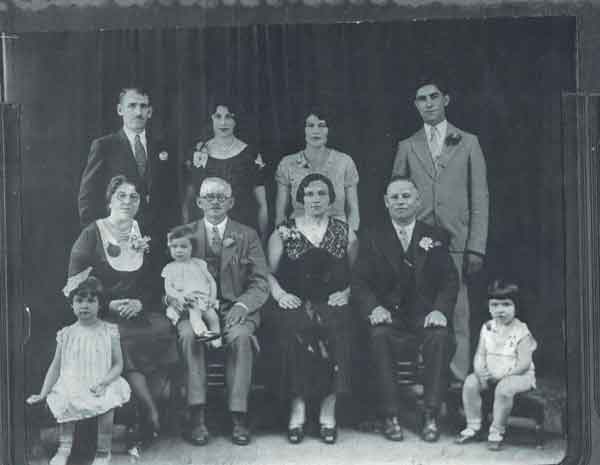
April 2024
Lisa Mahalu
When my grandmother Henia Ruhla landed in Canada from Romania in 1924, immigration officials cut her long dark hair as she stepped onto the soil of her adopted country.
Awaiting Henia’s arrival was her mother’s brother, Sam Blumenfeld, a junk dealer living in Hamilton, Ontario and a recent immigrant himself—who had sponsored my grandmother and her older sister three years earlier. In 1929, another two siblings arrived, and decades later, a brother.
For 31 years, I was fortunate to know my grandmother, an independent-minded woman who was widowed at 52. I formed a close bond with her, visiting her weekly when I was old enough to take the bus.
When I stepped inside her one-room apartment in Toronto, there was an ever-present smell of freshly cooked European foods. In that neatly appointed limited space, she had made room for a pet budgie bird in a cage next to the Singer sewing machine and the record player where she listened to the songs of her childhood. Hanging on her wall in a picture frame, pressed under glass, were her former hairlocks––a constant reminder of who she once was. She must have been traumatized, I thought, from the experience of losing part of her identity upon arrival in Saint John, New Brunswick.
I would perch myself on the edge of her bed surrounded by colourful crocheted blankets, in an area that also served as the living room. We watched her favourite television shows, including wrestling, and I asked questions about her life.
“Bubby, would you ever go back to Romania for a visit?” I asked one day.
“Never!” was her response, ending the topic for discussion immediately. But I never understood the reason for her abruptness. Until now.
After the death of my father in August 2021, my childhood curiosity was piqued again, and I took a deep dive into the unfamiliar world of family genealogy. What happened to my grandmother’s parents? Why had they not immigrated to Canada with all of their children?
When my great-grandfather took the long voyage across the ocean in July 1914 to build a better life for his family in Hamilton, he could not have imagined the loneliness and isolation of being detained on Ellis Island in New York, while Canadian immigration authorities determined his worthiness for admittance. As noted on the “List or Manifest of Alien Passengers for the United States Immigration Officer at Port of Arrival” ––my great-grandfather could not read or write.
With the flick of a wrist, “Rejected Canada” was written beside his name, and he was shipped back to Romania within 48 hours of arrival, only to be pronounced dead two months later. Did he die of a broken heart from the rejection? Was there an underlying health condition that prevented his successful immigration? Was illiteracy a deciding factor in his fate when they looked at his 5’10” build, with fair complexion, and brown hair and eyes?
Perhaps the government official said: “No, you are not worthy to partake of the fruits of this new land.” I will never know. But I am weighed down by the burden of it all, and the responsibility that comes with knowing. The research roadblocks I encountered felt like a persistent thorn in my side; its stinging remnants lingering long after the source of pain was discovered and extricated. How can I move forward in my grief?
I have come to understand that this singular moment in time shaped the fate of my extended family. A cousin in my father’s generation recalls hearing when she was a child how my newly widowed great-grandmother washed other people’s laundry to support her six children—ranging in age from 16 years to six months old.
For Henia, her siblings, and the uncle, I was able to find most of their birth, immigration, marriage, and death records to help me build the story of my paternal grandmother. However, during the time of immigration, each of them assumed a variety of names, randomly selected from their parent’s multiple surnames, their own birth names, or the names they chose for themselves in their newly adopted country. It made research very challenging.
During the two-year tenure of my exploration, I tried to immerse myself as best I could in the immigrant experience of my family. With each new find I would lie awake long into the night wondering about their lives. Were they happy? What were their hopes and dreams? Why did they choose Canada as their destination? How painful it must have been for Henia and her siblings to leave their mother behind in Romania.
My family of many names will continue to intrigue me, inspire me, and even haunt me.
I have this driving need to know how my grandmother felt after she reinvented herself as Annie in the new country. I have more questions for her that will never get answered. But I am determined to touch the soil of her childhood one day and find the grave of my great-grandfather to tell him that he was loved. I want to thank him for his bravery and desire to build a better life for his family and the familial bloodlines that followed.
The family tree is growing. It is my hope that I can tell more relatives about the story of our shared past and deepen the connections that bind us. It is the least that I can do to honour the memory of my ancestors.
I will always be grateful for the sacrifices that my great-grandparents made. It is a debt that I can never repay.

Sam Blumenfeld and wife Betty, with some of his nieces and nephews and their families.

